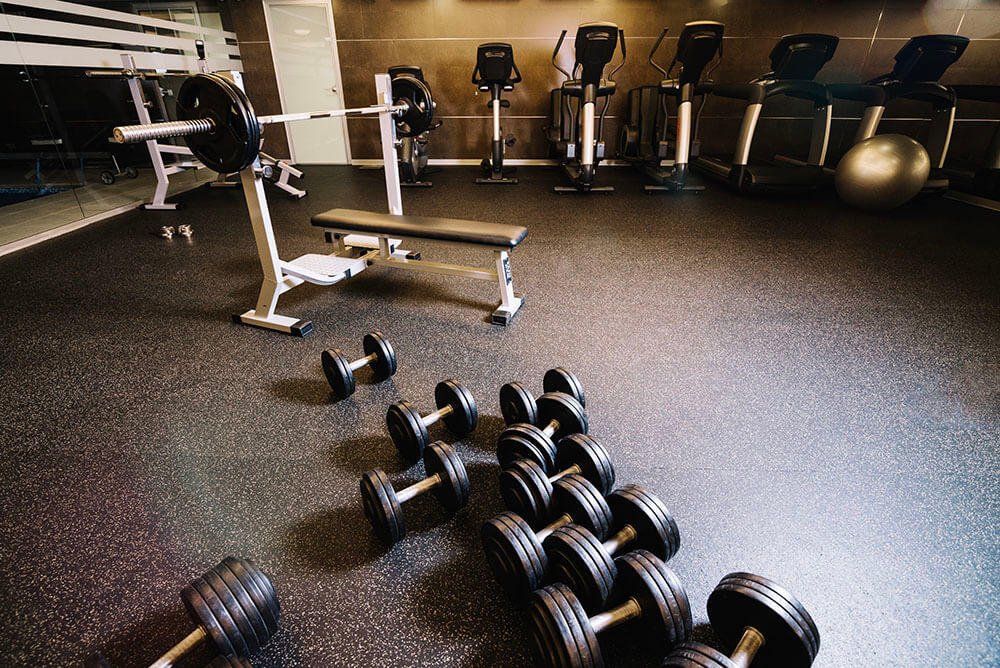Last Updated on January 21, 2020 by Nick J-Pepe
If you are looking to incorporate new workouts into your routine, you are likely considering adding the barbell bench press vs. dumbbell bench press.
The truth is, there are benefits to both. Below, we will be going over some of the differences when looking at the barbell bench press vs. dumbbell bench press.
Barbell bench press vs. dumbbell bench press
The barbell bench press is one of the most classic weightlifting moves that you will see many fitness enthusiasts doing in the gym.
It is also the preferred way to work out the chest for a variety of professional sports teams and is even used as a way to measure total upper body strength.
Barbell bench press vs. dumbbell bench press benefits:
1) Use more weight
One of the biggest benefits of this particular lift over a dumbbell hex press is the ability to add more weight.
Because the bar is completely fixed and because it requires much less stability in order to perform the various exercises with it, you are going to be able to add much more weight to each workout because you will not be working out your stabilizer muscles as much.
This will allow you to effectively target your chest, shoulders, and triceps accordingly and exert much more force as a direct result of being able to use more weight.
This can help you generate much more strength in these areas because you are going to be targeting the muscles with a lot more weight than if you were to use dumbbells.

2) Easier
Another benefit to doing this kind of exercise is the fact that it happens to be much easier to do. These exercises need recovery and iHerb coupon codes are to be used for an additional 5% off + 5% cashback loyalty credit.
Because it is one of the first exercises you are likely going to learn, it is something that is easy to grasp, and it can be very hard to have bad form while performing the exercise.
Because of this, it is a great exercise to incorporate into even the most beginners routine because it will not prove to be a risk to incorporate.
Some exercises you might want to avoid due to the risk of injury.
However, as long as someone is spotting you, it shouldn’t be too risky incorporating barbell bench presses into your routine.
Barbell bench press vs. dumbbell bench press drawbacks
1) No stabilization
While this might provide the benefit of being safer to implement, it is not going to be beneficial to building your stabilizer muscles.
As a result, you will be targeting muscles that likely do not need to be targeted to make you stronger overall.
2) Requires more supervision
Because you are going to be lifting such heavyweights, you are going to need to have supervision anytime you want to do barbell lifts.
Without the proper supervision or having a spotter in place, you risk getting injured from lifting too heavy of weights.
This can be a limitation because not everyone works out with a partner and if you do not have anyone there, you really won’t be maximizing your workout because you won’t be able to lift the heaviest possible weight which makes barbell lifting so effective.
Dumbbell bench press
The dumbbell bench press is one that has its own set of benefits and limitations.
This type of exercise requires much more stabilization in order to perform each rep. Therefore, it can be great at helping one develop stronger stabilizer muscles.
Barbell bench press vs. dumbbell bench press benefits
1) Requires more stabilization
While this might seem like a drawback, having to stabilize the dumbbells can help generate stronger stabilizer muscles which are muscles that are often under-targeted with all kinds of workouts.
Without targeting these muscles, your body ends up unbalanced which can lead to increased risk of injury.
By targeting stabilizer muscles, you will be able to maximize the strength of these muscles which can benefit your body in many ways.

2) Various grips
Another great benefit that comes with being able to use dumbbells for dumbbell presses is the ability to utilize various grips.
Because the dumbbells themselves are independent, you will be able to utilize various kinds of grips which can vary from either 90 degrees at the shoulder to around 45 degrees.
You can even utilize other grips to specifically target various muscles in your shoulder or body.
This means that it is a better exercise for those that are specifically rehabilitating from shoulder injuries where they need to target specific muscles in the shoulder area.
Being able to utilize various grips makes dumbbell presses much more versatile and better for a lot of instances.
Barbell bench-press vs. dumbbell bench-press drawbacks
1) Limited in weight
Not only is it going to be much more expensive to get the weights needed to use various dumbbell weights, but it is going to limit you in the amount of weight that you are going to be able to lift because it requires much more stabilization.
2) Increased risk of injury
While incorporating dumbbell lifts in your routine can be good to help minimize the risk of injury in the future, it is actually going to increase your risk of injury at the current moment because you will end up having to lift the weights and stabilize them with your weakest muscles.
Thus, your form is going to dictate how safe it is and whether or not you get injured.
Therefore, if you try to lift too heavy of weights without sufficient strength in these very muscles, you might end up injuring yourself.
Overall, there are plenty of different benefits to each form.
The one that you are going to want to implement into your routine is likely going to depend on your fitness goals and your current fitness capabilities.
A good exercise routine will incorporate both into a full exercise routine because they each have their own inherent benefits associated with them.
By incorporating both of them into your routine, you will be able to generate heavier lifts with your barbell bench presses and target specific stabilizer muscles and shoulder muscles with your dumbbell bench presses.
Each will help you in their own unique ways and should be incorporated into a full strength training routine because of it.

